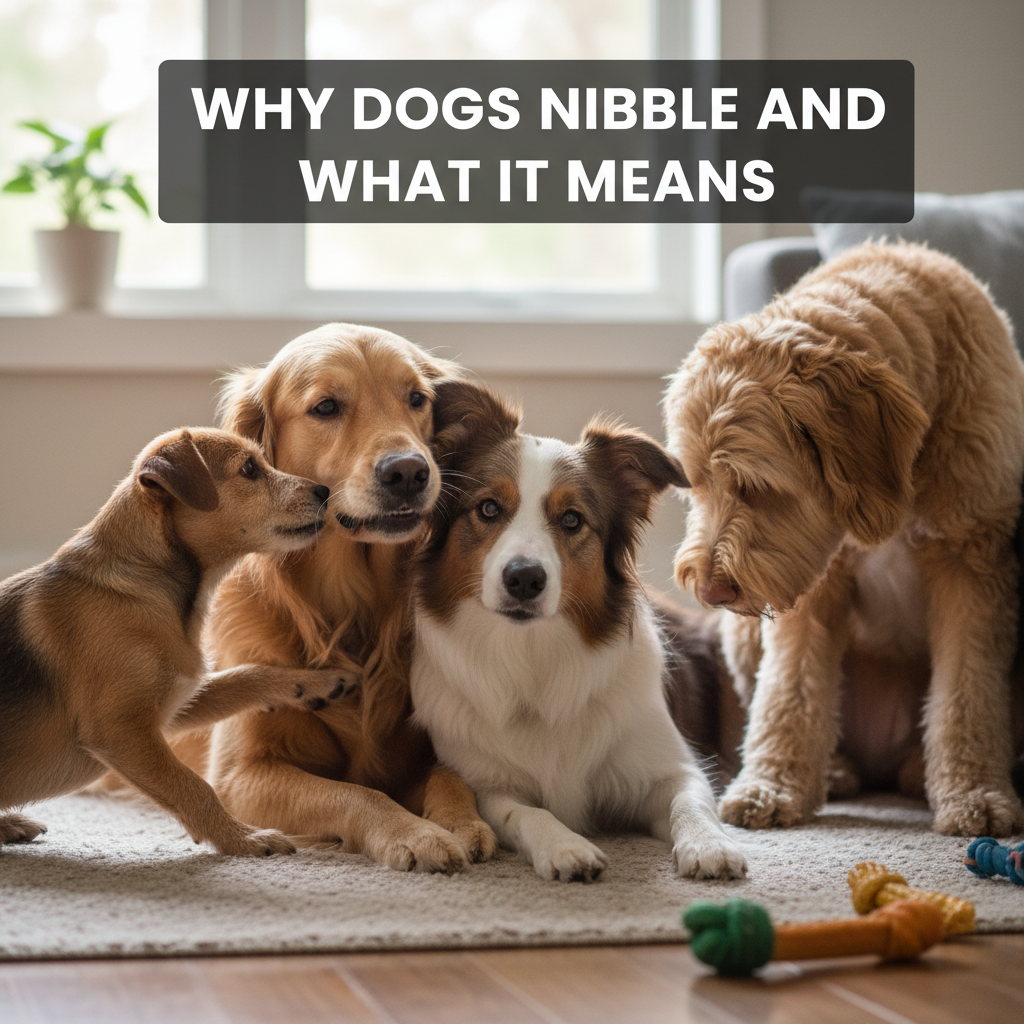Why Does My Dog Nibble Me? Understanding the Reasons Behind This Common Canine Behavior
Estimated Reading Time: 5 minutes
- Avoid misinterpretation: Understanding the reasons behind nibbling helps avoid misreading your dog’s intentions.
- Strengthen your bond: Recognizing affectionate nibbling can enhance your emotional connection with your pet.
- Address behavioral issues: Awareness of nibbling triggers can prevent unwanted behaviors.
- Promote healthy interactions: Engage with your dog positively to strengthen communication.
Table of Contents:
- Affection and Bonding
- Exploration and Play
- Teething
- Communication
- Attention-Seeking
- Breed Instincts
- Stress or Anxiety
- The Taste of Skin
- Conclusion
Affection and Bonding
One of the primary reasons dogs nibble on their owners is to express affection and bond. This behavior mimics the grooming habits seen among littermates. In their early interactions, puppies often groom each other as a means to build social connections. According to Best Behaviour Dog Training and Rover, dogs nibble to communicate love; it’s a way of saying, “I care for you!” This gentle nibbling can significantly enhance the emotional relationship between a dog and its owner.
Exploration and Play
Dogs, particularly puppies, use their mouths to explore their environments similarly to how human infants use their hands. When your dog nibbles on you, it can be a playful investigation or a way to explore textures with their mouths. This playful nibbling can also indicate a desire to engage in fun and playtime, showcasing their excitement and energy. As noted by Butternut Box and Kinship, this behavior is part of a dog’s natural curiosity and playful instincts.
Teething
For puppies, nibbling is often part of the teething process, relieving discomfort from the growth of new teeth. During this phase, it’s common for puppies to chew and nibble on anything they can find, including their owners. This behavior can persist into adulthood, especially if the dog has not been adequately socialized to manage its mouth restraint during its formative years. As stated by Petcube and Butternut Box, it’s essential to provide appropriate chew toys to help alleviate any discomfort associated with teething.
Communication
Nibbling can serve as a form of communication between dogs and their owners. Dogs sometimes nibble to get attention, guide their owners towards something they want, or signal a specific need. Understanding the context of the nibbling along with your dog’s body language is vital to interpreting its meaning. As highlighted by Kinship, assessing the situation will help you respond adequately to your pet’s needs.
Attention-Seeking
Dogs may nibble when they feel neglected or want interaction from their owners. This attention-seeking behavior can strengthen if the nibbling successfully garners attention, whether positive or negative. In such cases, trainers and experts suggest encouraging positive reinforcement for desired behaviors instead of reacting to unwanted nibbling. You can read more about this on Petcube and Butternut Box.
Breed Instincts
Certain dog breeds, especially herding or retriever breeds, may display nibbling behavior due to their historical roles. These breeds have been instinctively bred to use their mouths to guide livestock or retrieve objects. Thus, nibbling can be an inherent behavior linked to their skills and training. More details can be found on Petcube.
Stress or Anxiety
In some instances, nibbling can indicate stress or anxiety. It’s crucial for pet parents to monitor other signs of distress, such as a tucked tail, wide eyes, or trembling body posture. If you suspect that your dog’s nibbling stems from anxiety, it may be beneficial to explore strategies to mitigate stress, such as providing a safe space or engaging in calming activities. This aspect is discussed further by Rover and Butternut Box.
The Taste of Skin
Interestingly, some dogs are drawn to nibble on human skin due to its salty flavor. This attraction is simply a matter of taste, as many dogs enjoy the saltiness, especially after physical activity. Though misleadingly simple, it’s worth noting that the allure of flavor may play a role in why your dog chooses to nibble on you rather than other objects. For more insights, refer to Rover.
Conclusion
Understanding why dogs nibble on their owners can provide insightful perspectives into canine behavior and enhance the bond between pet owners and their furry companions. Whether your dog is expressing affection, seeking attention, or simply engaging in playful exploration, this behavior can enrich your relationship when understood correctly. However, awareness of stress indicators and unmanageable nibbling habits is essential to fostering a harmonious environment.
If the nibbling becomes excessive or aggressive, it’s important to consult with a professional dog trainer or behaviorist who can help you address any underlying concerns. At Your Company Name, we specialize in pet consulting and are here to support you with expert advice and tailored solutions for your unique situation. Whether you’re looking for tips on teething, behavioral communication, or general dog care, explore our services or contact us for more information. Let’s strengthen your bond with your pet together!
FAQ
A: Your dog may see this as a bonding moment or an invitation to play. It’s their way of interacting and getting your attention.
A: In most cases, nibbling is not aggressive but rather a form of communication or affection. However, monitor your dog’s body language for other signs of aggression.
A: Redirect your dog to a chew toy or reward them for positive behaviors. Consistency is key in training.
A: Yes, certain breeds with herding or retrieving backgrounds may nibble more due to their instinctive behaviors.
